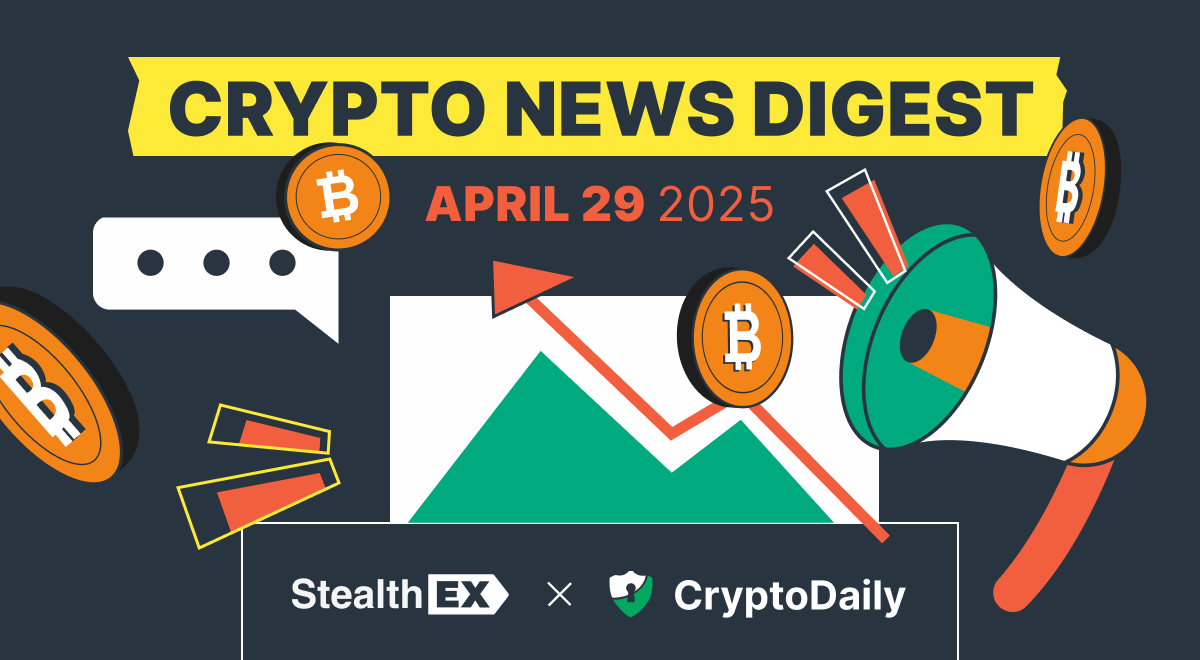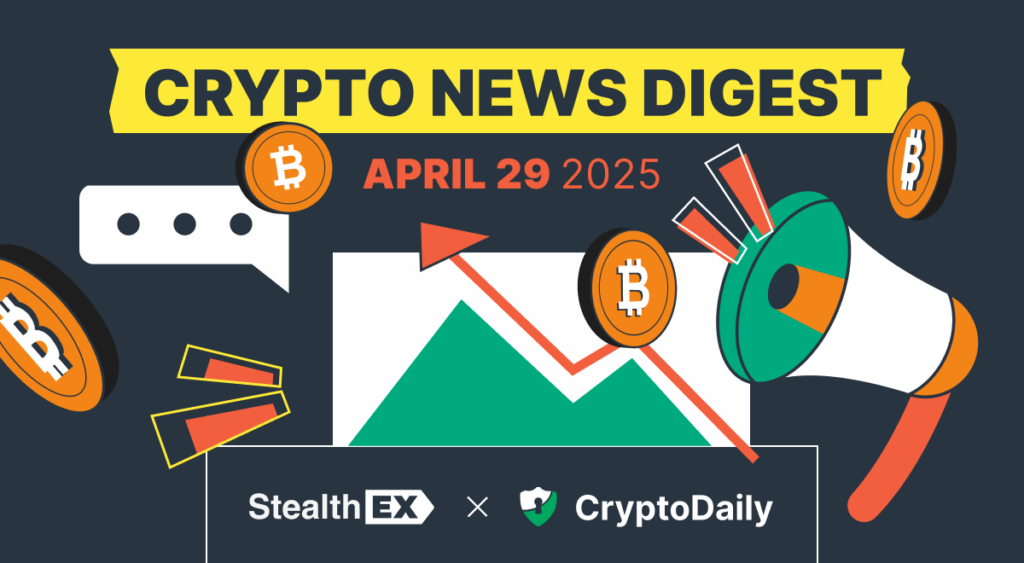Stripe Adds Stablecoins, Coinbase Cuts PYUSD Fees, Trump’s ETFs

Catch the latest updates from StealthEX and CryptoDaily! We pick the biggest crypto stories every week and break them down for you. Wondering what’s buzzing right now? Our quick recap covers the must-know highlights. Easy to read, easy to follow — perfect for staying ahead. Let’s jump right in!

Article contents
- 1 Stripe Takes Stablecoins Global with New Payment Platform
- 2 Coinbase Ditches Fees to Boost PayPal’s PYUSD Stablecoin
- 3 Trump Media Teams with Crypto.com for New “Made in America” Crypto ETFs
- 4 Deutsche Bank and Standard Chartered Eye U.S. Crypto Market
- 5 Metaplanet Cements Its Place as Asia’s Top Bitcoin Holder
- 6 ZKsync Recovers $5.7M After Hacker Accepts Bounty Deal
- 7 Major Ripple Library Breach Puts XRP Wallets at Risk
- 8 SEC Delays Polkadot and Hedera ETF Decisions Again
- 9 Russia Plans Elite Crypto Exchange for Millionaire Investors
Stripe Takes Stablecoins Global with New Payment Platform
Stripe is rolling out a stablecoin-based service for companies outside the U.S., U.K., and Europe. This bold move could boost the Dollar’s reach around the world.
The new product runs on Bridge’s infrastructure. Stripe bought Bridge in October 2024 for $1.1 billion after getting a green light from regulators.
Stripe CEO Patrick Collison and co-founder Jeff Weinstein announced the project on X. Collison invited businesses to test the system, saying they had dreamed of building it for a decade.
Bridge offers simple APIs to accept and move stablecoin payments. It cuts out banking middlemen and even rivals systems like SWIFT.
Developer Jen Kim said the product is already open for testing. She mentioned that users in over 90 countries have started making payments using stablecoins through Stripe’s tools.
This could be a huge win for Stripe’s bottom line. Experts predict the firm could earn billions from holding reserves in U.S. Treasuries.
Bridge connects coins like USDT and USDC to traditional finance. It’s a big step toward faster, cheaper global money transfers.
Stripe isn’t new to crypto. It first added Bitcoin payments in 2014 but dropped them in 2018 due to technical issues. Now, it’s back, supporting USDC transactions on Ethereum, Solana, and Polygon.
Coinbase Ditches Fees to Boost PayPal’s PYUSD Stablecoin
Coinbase has dropped all fees for PayPal USD (PYUSD) trades to boost stablecoin use. The move is part of a bigger deal with PayPal.
On Thursday, Coinbase shared the news in a blog post. The goal is simple: make PYUSD a top choice for payments and digital commerce.
PayPal’s stablecoin hasn’t taken off yet. It holds under 1% of the dollar-backed market, with about $730 million in circulation.
In comparison, Tether’s USDT rules the space with a 66.5% market share. Circle’s USDC follows at 28.3%.
Coinbase and PayPal want PYUSD to become a regular part of daily transactions. Users will be able to easily redeem PYUSD for U.S. dollars, making it even more useful.
Merchants also stand to benefit. They can accept PYUSD without needing banks or credit card companies.
PayPal’s CEO Alex Chriss said he is excited about the partnership. He wants PYUSD to drive new innovations across crypto and payments.
Stablecoins like PYUSD offer speed and global reach. Companies hope they will soon go beyond crypto trading and transform how people pay around the world.
Coinbase’s fee cut could be the push PYUSD needs to catch up in the competitive stablecoin race.
Choose StealthEX for Exchange and Buy Crypto.
- User-Friendly — Simple and minimalistic interface for everyone.
- Fast and Private — Instant non-custodial cryptocurrency exchanges.
- Buy crypto with Credit Card.
- 1500+ coins and tokens are available for limitless, quick and easy exchanges.
- NO-KYC crypto exchanges — Buy cryptocurrency up to $700 without KYC!
- StealthEX crypto exchange app — Process crypto swaps at the best rates wherever you are.
- 24/7 Customer Support.
Earn from Each Exchange by Joining StealthEX Affiliate Program.
Become a partner right now and use affiliate tools:
- Public API — Earn from your wallet, aggregator, or exchange terminal.
- Referral Links — Recommend StealthEX to your audience.
- Exchange Widget — Built crypto exchange widget on any page of your website.
- Button — A perfect choice for traffic monetization.
- Banner — Track conversion and stats right in the personal cabinet.
Trump Media Teams with Crypto.com for New “Made in America” Crypto ETFs
Trump Media and Technology Group is making a bold move into crypto investments. It has teamed up with Crypto.com and Yorkville America Digital to launch new ETFs under its Truth.Fi brand.
The partnership was announced on April 22. It follows a previous non-binding agreement made last month.
These ETFs will combine cryptocurrencies and traditional stocks. The focus will be on American-made industries.
Crypto.com will handle the technical side. It will provide crypto custody and support through Foris Capital US LLC, its U.S. broker.
Yorkville Advisors, already close to TMTG, will manage the funds. The products are expected to launch in 2025 if regulators give the green light.
Trump Media plans to invest up to $250 million of its own money into the venture.
Yorkville’s relationship with Trump Media has grown over the past year. Through a standby agreement, Yorkville helped TMTG raise nearly $450 million by buying shares at discounted rates.
Originally known for Truth Social, TMTG has moved aggressively into fintech with Truth.Fi. The company is now building a stronger foothold in digital assets.
With new ETFs and big crypto plans, Trump Media is setting the stage for a major expansion into finance and tech.
Deutsche Bank and Standard Chartered Eye U.S. Crypto Market
Deutsche Bank and Standard Chartered are planning to grow their crypto operations in the United States. Favorable regulations and client demand are driving the move.
The Wall Street Journal reported that both banks see fresh opportunities in the U.S. crypto space. They want to meet growing interest from big investors and wealthy clients.
Crypto offers banks more than just a new service. It opens the door to trading profits, custody fees, and new financial products.
The U.S. market looks a lot friendlier to crypto now than in past years. Regulators have taken a more open approach under the current administration.
Both banks are evaluating how to expand their services. They are betting that crypto will be a major part of finance in the future.
Industry insiders believe more traditional banks will follow. Growing adoption and clear rules could make the U.S. the top global hub for crypto finance.
Deutsche Bank and Standard Chartered aren’t rushing. They want to build careful, sustainable strategies for their U.S. crypto efforts.
If they succeed, they could set a new standard for how big banks handle digital assets worldwide.
Metaplanet Cements Its Place as Asia’s Top Bitcoin Holder
Japanese investment firm Metaplanet just bought another 330 Bitcoin. The $28.2 million purchase boosts its holdings to over $423 million.
CEO Simon Gerovich confirmed the latest buy on April 21. The firm paid an average of $85,605 per BTC coin.
Metaplanet’s strategy is clear. It wants to build a massive Bitcoin treasury. The company’s goal is to own 21,000 BTC by 2026.
This latest move cements Metaplanet as Asia’s largest corporate Bitcoin holder. It now ranks 10th in the world among companies with BTC reserves.
Metaplanet’s Bitcoin stash has doubled in value this year. The firm funds these buys through business profits and the capital markets.
It tracks its growth with custom metrics like BTC Yield, BTC Gain, and BTC ¥ Gain.
BTC Yield measures how Bitcoin holdings grow compared to share count. In Q2 2025, Metaplanet posted a 12.1% yield after a massive 95.6% in Q1.
The company also shares data showing how its Bitcoin wealth grows both in BTC and in yen terms.
Metaplanet believes in full transparency. It wants investors to see exactly how Bitcoin boosts shareholder value over time.
With each new buy, Metaplanet tightens its grip on the future of corporate Bitcoin investing.
ZKsync Recovers $5.7M After Hacker Accepts Bounty Deal
ZKsync has recovered nearly $5.7 million in crypto after a hacker agreed to return stolen funds. The breach happened earlier this month, but a bounty offer helped resolve the issue.
On April 23, ZKsync confirmed that the hacker returned 90% of the stolen tokens. This came after the platform offered a “safe harbor” window, allowing the attacker to keep 10% as a reward.
The returns happened fast. Three transactions on the ZKsync Era blockchain moved over $4.3 million worth of tokens and Ether back to the Security Council wallet. Another $1.4 million was sent to an Ethereum address linked to the council. It all happened within 13 minutes.
The hack targeted airdrop reserves, not user funds. The attacker used a compromised admin key to mint 111 million ZK tokens. Luckily, core systems stayed safe.
Matter Labs, the firm behind ZKsync, acted quickly. It filtered transactions to stop stolen funds from moving.
Since the attack, ZK tokens and Ether prices have climbed. This boosted the total value of recovered assets beyond what was initially lost.
The Security Council now holds the funds. Final decisions on the assets will be made by ZKsync governance after a full investigation report is completed.
Major Ripple Library Breach Puts XRP Wallets at Risk
A critical hack has shaken the Ripple XRP ecosystem. Malicious code slipped into the widely-used xrpl.js library, endangering thousands of crypto wallets.
Security firm Aikido found the breach on Monday evening. A hacker inserted code into the official Node Package Manager (NPM) versions of xrpl.js, aiming to steal private wallet information.
The malicious versions were online for just over an hour. Still, they posed a huge threat. Wallet seeds and private keys could have been stolen and sent to a hacker-controlled server.
Not every project was hit. Only those who updated the library during the brief window were exposed. Projects like Xaman Wallet and XRPScan confirmed they are safe.
Aikido’s Charlie Eriksen warned users to act fast. If there’s any doubt, assume keys were compromised. Move assets to a fresh wallet immediately.
The XRP Ledger Foundation moved quickly too. It released clean versions of xrpl.js to block the threat. Developers were urged to update without delay.
The Foundation promised a detailed post-mortem once investigations finish. Until then, all developers working with XRP projects are encouraged to audit their dependencies carefully.
This incident highlights how a single library breach can ripple through an entire crypto ecosystem.
SEC Delays Polkadot and Hedera ETF Decisions Again
The SEC has once again delayed rulings on new crypto ETF proposals. Decisions on Polkadot and Hedera funds will now come in June.
In a filing released Thursday, the agency said it needs more time. Grayscale’s bid to turn its Polkadot Trust into a spot ETF will be reviewed by June 11. The same deadline applies to Canary Digital’s Hedera ETF proposal.
The SEC also pushed back its decision on Bitwise’s Bitcoin and Ethereum ETF to June 10.
The regulator explained the delays as necessary. It wants a longer review period to dig deeper into the proposals and public comments.
In its Hedera ETF filing, the SEC wrote that extra time is “appropriate” to properly handle all issues raised.
Crypto fund proposals have exploded in number over the past year. The SEC is moving carefully, balancing innovation with market safety.
While the delays are frustrating for some investors, they follow a familiar pattern. The agency is known for taking a cautious approach when it comes to digital assets.
Many in the industry are still hopeful. They believe that thorough reviews today could pave the way for wider ETF approvals later this year.
Russia Plans Elite Crypto Exchange for Millionaire Investors
Russia is building a state-backed crypto exchange, but only for the super-rich. Finance Minister Anton Siluanov announced the plan this week.
The platform will work under an experimental legal regime. Access will be limited to “super-qualified investors” — those with at least $1.2 million in assets or earning over $600,000 per year.
Officials said the financial limits could still change. Discussions are ongoing.
The idea is to pull crypto operations out of the shadows without disrupting Russia’s domestic economy. The exchange will not connect to Russia’s main financial system. Instead, it will handle permitted transactions under special rules.
Since 2021, Russians have been allowed to own and trade crypto, but not use it for local payments. Many investors rely on foreign exchanges. The new platform aims to give Russia’s wealthiest an official option.
Deputy Finance Minister Osman Kabaloev stressed that final investor requirements are still up for debate.
The move is part of a larger strategy to regulate digital assets carefully. It shows that while Russia remains cautious, it still sees opportunity in controlled crypto innovation.
Whether this exclusive exchange will attract demand remains to be seen.
This article is not supposed to provide financial advice. Digital assets are risky. Be sure to do your own research and consult your financial advisor before investing.
crypto ETF CryptoDaily Donald Trump stablecoin TrumpRecent Articles on Cryptocurrency
 Arbitrum Price Prediction: Is ARB Crypto a Good Investment?
Arbitrum Price Prediction: Is ARB Crypto a Good Investment?  PancakeSwap Price Prediction: Will CAKE Coin Hit $10?
PancakeSwap Price Prediction: Will CAKE Coin Hit $10? 